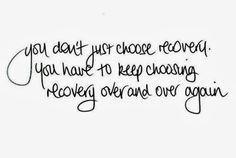This is another choice of words that aren’t used correctly or appropriately. Very much like my post on preventing an eating disorder. It gets bandied around so much that it sounds like it’s a simple choice. That it is something totally within your control at whatever stage of an eating disorder you are.
Eating disorders are a mental illness. They do not conform to normal thinking standards.
The normal decision process is compromised. The lower the weight – the more compromised.
If this was any other illness, medical intervention would happen regardless.
The medical profession would step in and save their lives. But for some weird, unknown reason, the medical profession thinks that eating disorder patients should be treated as normal sick people and can make their own decisions about their health. They assume that as adults (16 and up) anyone has the ability and right to choose, that any intervention is wrong or intrusive or demeaning. They assume that people with eating disorders can choose logically and clearly. My heart is wrung from letters and stories I am sent from parents with adult children, who are ignored by the medical professional. They are sent home from treatment places and hospitals because they don’t cooperate or discharge themselves. No severely sick ED patient cooperates. It is always a fight as the ED is in control. They are given no ongoing help after suicide attempts or almost heart failure emergencies. They are told over and over again, they simply have to choose to recover – then they will get the help they need. There are a million cute posters and pics depicting the ability to choose. It’s not a blanket, one size fits all. Choosing comes at an appropriate time in recovery.
What heartbreaking bull-shit! At very low weights most ED sufferers cannot choose to make the right decisions for their health. Their perception and thought processes are compromised heavily by the ED. Their ability to rationalise, make decisions, be logical and to choose a healthy life is radically and negatively challenged. Most cannot do this. Age is not the deciding factor of whether they can choose. Regardless of age, the ED is in full control. They deny, compromise, side-step or whatever to not give up the eating disorder. Many cannot even see it is the eating disorder that controls and distorts their perceptions. It’s not that they love their eating disorder – most of them hate having to live a life that is controlled, miserable and painful. Many do see what they are missing out on, but cannot make the choice to change. If they do manage this, they end up compromising with the eating disorder. “I will gain this many kilo, but not enough to be this weight.” ” I will eat enough to stay out of hospital”. ” I will eat just enough to have a baby”. Forward steps, but not really choosing recovery. It doesn’t matter what age the sufferer. Under the heavy control of the eating disorder at low weights all thinking and choice/decision processes are heavily distorted.
Under 18’s are subjected to early intervention and refeeding programs to get weight back to the correct level and to keep it stablised at this point for a few months. The brain is nourished and it thinks more clearly and is able to make more logical, clear decisions. The longer the stable weight, the better the brain function. Once recovery gets to this stage of stable, correct weight THEN the choice to recover becomes a real thing. Sufferers are learning by now they are not the ED. They learn they are separate and can continue to separate further from the ED. Choosing to recover from this point is a hard decision in itself. It means leaving the ED, means facing fears of eating and food. It means striking out into the unknown, confronting mental and emotional issues and learning to heal and find other ways of responding to life without retreating to the ED. All this goes through the mind of a sufferer. The strength is in knowing recovery is possible and recovery is real.
T he sufferer chooses to fight back on a daily basis towards a goal of higher, strong recovery. Each meal, each thought, each behavior becomes a choice – the ED or recovery. It’s not easy. At first the choice is pretty much always lost or is a serious struggle. But it gets easier with each victory – no matter how small. Celebrate each small choice – it’s a step away from the ED. This is choosing to recover. Each day, many times a day. Choosing to recover does not at the very sick, low weights.
he sufferer chooses to fight back on a daily basis towards a goal of higher, strong recovery. Each meal, each thought, each behavior becomes a choice – the ED or recovery. It’s not easy. At first the choice is pretty much always lost or is a serious struggle. But it gets easier with each victory – no matter how small. Celebrate each small choice – it’s a step away from the ED. This is choosing to recover. Each day, many times a day. Choosing to recover does not at the very sick, low weights.
Sophie only survived because of medical intervention. If her heart had been that little bit stronger, the hospital would have allowed her to choose!!! Really?? She was too sick to make a logical decision to eat. She couldn’t and wouldn’t. If they had left her to choose, she would have died or been on life support. She was strident in her fear and denial and refused all food. The NG tube saved her life and nourished her brain. Her choice to recover came after her 3 trip to hospital and she had been at a reasonable stable weight for a few months. Her daily choosing to recover started from this point. Choosing to stay strong. Choosing to keep moving forward. Didn’t always happen, but the goal and choice was there.
It’s exhausting choosing to recover, despite the correct weight and with a nourished mind. So many give in for a meal, a day, a week and so on, just to give themselves a rest from the screaming ED voice in their head. It takes a lot to fight back. It is again, a mental health illness, not an illness about weight and food.
Sophie sits beside me as I write this. She agrees with it all, and has verbally said some of what is written. She said she could not choose to recover until her body and brain had reached a stage of feeling better and thinking more clearly. Her thoughts – when she is an adult and if this happens again, I have permission to get full medical intervention and tube feed her again. She knows and agrees that there was no way she could have ever made a decision to save herself at the low weight she was. Adult sufferers are not different to teenagers. We just give them rights that do not exist in the realm of eating disorders, and with faulty medical care, old beliefs and myths they remain where they are, attached to the eating disorder.

